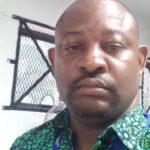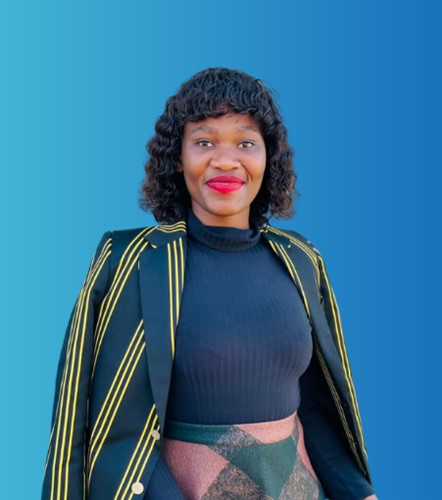Last year, Churchill College and Churchill Archives Centre signed an important agreement with the University of Fort Hare, home to the National Heritage and Cultural Studies Centre (NAHECS) which holds the archive of South Africa’s Liberation Movements. The two organisations agreed to combine forces for heritage and research. Six months on, we are delighted to report that the first phase of the agreement will begin on May 12th with the arrival of two researchers from the University of Fort Hare.
Ayodele Ladokun, Technical Archivist for the NAHECS and digitisation manager of the Liberation Archives, and recent graduate Ayabonga Meyi, will join the College for a term of study based in the Churchill Archives Centre from the 12 May – 22 June 2023. Ayodele is a South African permanent resident originally from Ibadan in Nigeria and has worked in different units at the University of Fort Hare for almost 18 years. Ayabonga is from Middledrift in the Eastern Cape in South Africa and recently graduated for Archives and records management at the University of Fort Hare.
Allen Packwood, Director of the Churchill Archives Centre, said: ‘The Archives Centre is very excited to be part of this wonderful collaboration with the University of Fort Hare. It has been a long time in the planning and we look forward to welcoming Ayodele and Ayabonga.’ Allen Packwood
To celebrate their imminent arrival at the College, we caught up with Ayodele and Ayabonga to find out more!
Meet Ayodele

What first inspired you into your field?
I have multiple academic and professional backgrounds, the most prominent being in ICT. I also had the opportunity of working with one of the leading 20th Century Historians by the name of Professor Luvuyo Wotshela who used (and still does) archival materials to write books and articles. While working with him, it dawned on me that these sources are so vital for historical research and they needed to be properly preserved. With one of my backgrounds being in geography, I try to oversee the environmental and safety conditions of the physical collections we have in our repository. Since one of the modern methods of preserving an archive is to digitise them, my background in ICT gave me the skills to oversee the process. We first had to oversee the digitisation of the ANC’s Liberation Archives records (which was done by a private company). Then we started the digitisation of our university records that dated back more than 100 years in 2018. I was the coordinator for the project. I had to manage the process of digitisation, the personnel (six archivists) involved, the budget and the equipment. Since then, I have never looked back.
What is your special area of interest?
My area of interest is more on digitisation, digital asset management system and access control. I am also interested in facilitating collaborations between different archives worldwide so that researchers of various fields in academia can have access to archival information using modern technology.
What will you be researching at the Churchill Archives Centre?
I will be focusing on the area of digitisation, access control and safety of digital assets. As we are still young in the journey of digital assets management systems, I would love to know how the Churchill Archives Centre went through their own journey to digitisation. I would also like to hear about the different challenges they encountered, especially around access control, security of digital materials along with the policies that they are using to guide the use of their digital assets. On the physical side, I would also like to do a comparative study on how our respective archives maintain their physical archives and give access to their researchers.
What do you hope to achieve because of this visit?
I have quite a bit of experience in the creation of the digital archives, but I would like to tap into the experience of managing a digital archive (access, intellectual property rights, control, and safety). I would also like to know what preventative measures they have when it comes to securely managing their digital assets. Are there also disaster recovery plans? What policies are you using to guide digital archives control, safety, and use? How they overcame their challenges both during the digitisation processes and (if any) digital archives management.
What are you most looking forward to?
Firstly, coming to Cambridge has always been a dream. Also, I would love to experience firsthand how archivists and digital archives managers operate so that I can gain more knowledge about the field. I have worked with archivists of different backgrounds here, and this exciting opportunity to spend time with the Churchill Archives Centre will further enrich my knowledge about the field.
Any other thoughts regarding the impact of this partnership?
There is a long connecting (and intertwining) history between the United Kingdom of Great Britain and South Africa that dates back centuries. Numerous academics around the world have travelled to our archives in South Africa to source materials for research. I am sure the same has happened at the Churchill Archives Centre too. This collaboration will allow even bigger access to academics from various disciplines, especially in humanities and Social Science to tap into new research niches and it will push scholarship to the next level. Our collaboration will also allow scholars from both Centres (Universities) open new research grounds by having access to each other’s materials. I see this as a very exciting academic venture.
Meet Ayabonga

What first inspired you into your field?
What inspired me into studying archives and records management was being able to hold and manage authentic and original documents which are rare. My special area of interest is digitisation and having to digitise documents is something I would like to experience and learn more about practically.
What will you be researching at the Churchill Archives Centre?
I will be trying to learn how to manage digital archives because it will be a new experience for me. I hope to achieve new skills that will help me to be able to archive or approve material that needs to be archived, which will be beneficial to researchers or anyone interested in that particular material.
What are you most looking forward to?
I’m looking forward to the exposure and experience that I will gain, the skills that I will acquire and help me grow in my profession as a newly qualified archivist.
Any other thoughts regarding the impact of this partnership?
Because of the connecting history between the United Kingdom and South Africa, there will be a lot of potential scholarly debates and publications that would be generated. For me, the partnership will give us more materials to offer to researchers and that would in the long run benefit scholarship.
Find out more
The University of Fort Hare’s Alice Campus has a National Heritage and Cultural Studies Centre (NAHECS) which holds the archive of South Africa’s Liberation Movements, containing collections of various political organisations. The UFH was universally endorsed as the appropriate custodian of the archive of South Africa’s Liberation Movements because of its association with struggle movements in South Africa, and its role in producing several influential leaders in various fields in sub-Sahara Africa.
